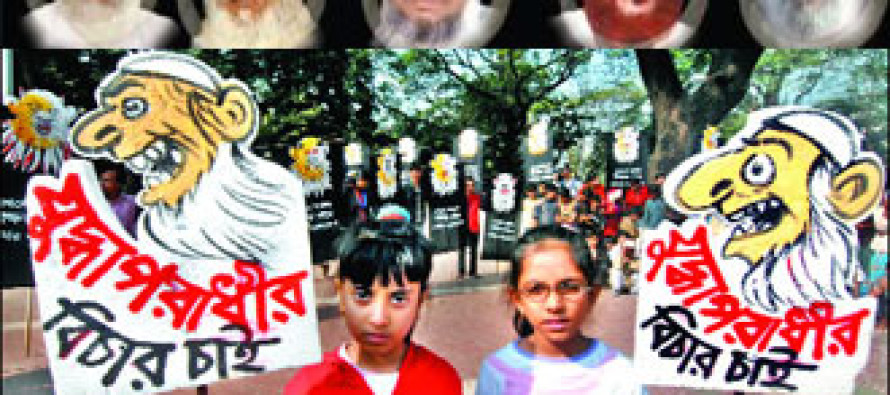Trial of Alleged War Criminals and Abettors

The term “war criminal” is a generic term. It refers to a person who allegedly committed any of the three international crimes: (a) genocide, (b) crimes against humanity and (c) grave breaches of the 1949 Conventions, 1949, relating to War to protect civilian populations. The first two can be committed in time of war or in peace.
The atrocities perpetrated by Pakistani soldiers in Bangladesh on civilian population during the 1971 Liberation War constitute all three international crimes, such as genocide, crimes against humanity and war crimes.
Genocide ,crimes against humanity, and war crimes may be tried by any state under universal jurisdiction. The collorary of this principle is besides Bangladesh, both India and Pakistan have jurisdictions under international law to put any accused person under trial for such crimes.
Crimes of 1971:
For crimes of 1971, two sets of laws were made in the country. The first set of law was proclaimed on 24th January 1972, titled the Bangladesh Colloborators (Special Tribunals) Order 1972. This law was to prosecute certain persons, individuals or as members of organisations, who directly or indirectly, have aided or abetted the Pakistan armed forces in committing international crimes.
The second set of law was enacted on July 24 1973, the International Crimes (Tribunals) Act and Article 47(3) of the Constitution was inserted in July 1973 to implement the International Crimes (Tribunals) Act. This law was enacted to try and punish any member of armed forces, defence or auxillary forces, accused of international crimes, not war crimes only.
The preparation of this 1973 Act took some time because of the complexities of principles of international law involved (I was representing the Foreign Office in the Committee that prepared the draft of this law), partly because in May 1973, Pakistan lodged a case before the International Court of Justice at The Hague, against India, asking the Court not to hand over to Bangladesh for trials the 195 Pakistan prisoners of war, accused of international crimes. The case at The Hague could not proceed because India did not accept the jurisdiction of the International Court of Justice.
Bangladesh has confronted certain ground realities in the early years (1972-75) and they were :
(a) Bangladeshi civilian and military officers remained stranded in Pakistan because the Pakistan government held the Bangladeshi officers as hostages unless Pakistani pows (prisoners of war) were released.
(b) 90, 000 Pakistani pows including senior military officers (195 in number) who had allegedly committed international crimes, were in the custody in India.
Clemency under the Colloborators Order:
Bangladesh government announced first clemency on 16th May 1973 under the 1972 Order for persons convicted or charged with offences under this law.
A second clemency was announcerd under the same law on November 30, 1973 for those who were convicted or accused of serious crimes.
Many legal experts argue that the aforesaid acts of clemency under the Collaborators Order are legally untenable because the President is empowered under Article 49 of the Constitution to grant pardons only to convicted persons and not to accused charged with crimes
With the change of regime in 1975, the Colloborators (Special Tribunals) Order of 1972 was repealed on 31 December, 1975. Under the law, all proceedings in any tribunal, magistrate, or court and all investigations or other proceedings before any police officer or other authority “shall abate and shall not be proceeded with”.
Trial of Pakistani military officers:
In September 1973, India (with the agreement of Bangladesh) and Pakistan concluded a deal to exchange Pakistani pows, except the 195 senior military officers, for Bangladeshi civilian and military officials stranded in Pakistan to return to Bangladesh. (Bangladesh could not directly negotiate with Pakistan on any matter because Pakistan did not recognise Bangladesh until February 1974).
Bangladesh government on 17th April 1973 announced its decision to put on trial Pakistani 195 senior armed officers, accused of international crimes.
However international community was much less concerned with commission of international crimes than it is now and India was keen on maintaining peace and harmony in South Asia and was not interested in trials of Pakistani officers that remained in India.
Given the external environment at the time, Bangladesh announced clemency for the 195 Pakistan pows after Pakistan’s plea of “forgive and forget” and they were allowed to return to Pakistan, under the Tripartite Agreement of April 9, 1974.
It is argued that those persons who were accused of international crimes by assisting or abetting Pakistan military in the country could be prosecuted under the 1973 International Crimes (Tribunals) Act because the law provides for trial and punishment of any member of “auxillary forces”. The elected government has rightly decided to ask for assistance of the UN in the matter.
By Barrister Harun ur Rashid
Former Bangladesh Ambassador to the UN, Geneva.


